Themed collection Recent Advances in Alkane Conversion

Propane to olefins tandem catalysis: a selective route towards light olefins production
Combining propane dehydrogenation with propylene metathesis in a single step yields mixtures of propylene, ethylene and butenes, important building blocks for the chemical industry. The open challenges and opportunities in the field are highlighted.
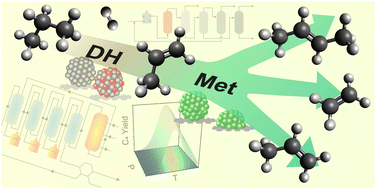
Chem. Soc. Rev., 2021,50, 11503-11529
https://doi.org/10.1039/D1CS00357G
Activation and conversion of alkanes in the confined space of zeolite-type materials
Microporous zeolite-type materials are able to activate and efficiently convert stable C1+ alkanes. This review analyzes, at the molecular level, the role of active sites and the contribution of diffusion, shape-selectivity and confinement effects.
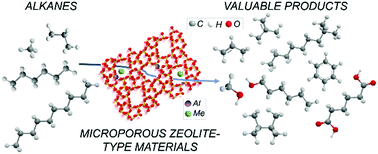
Chem. Soc. Rev., 2021,50, 8511-8595
https://doi.org/10.1039/D0CS01459A
Heterogeneous alkane dehydrogenation catalysts investigated via a surface organometallic chemistry approach
Alkane dehydrogenation over heterogeneous catalysts has attracted renewed attention in recent years. Here, well-defined catalysts based on isolated metal sites and supported Pt-alloys prepared via SOMC are discussed and compared to classical systems.
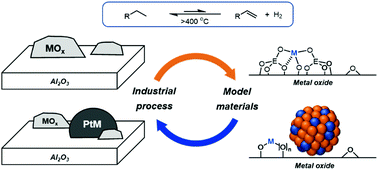
Chem. Soc. Rev., 2021,50, 5806-5822
https://doi.org/10.1039/D0CS01424A
Recent progress in heterogeneous metal and metal oxide catalysts for direct dehydrogenation of ethane and propane
Metal and metal oxide catalysts for non-oxidative ethane/propane dehydrogenation are outlined with respect to catalyst synthesis, structure–property relationship and catalytic mechanism.
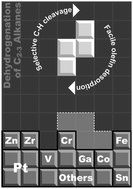
Chem. Soc. Rev., 2021,50, 5590-5630
https://doi.org/10.1039/D0CS01260B
Dehydrogenation of light alkanes to mono-olefins
This review summarizes recent progress in the catalysts and reactors for light alkane dehydrogenation, providing new directions for dehydrogenation technologies.
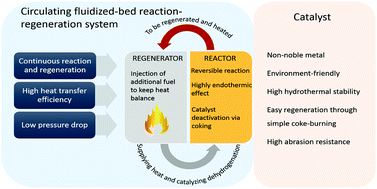
Chem. Soc. Rev., 2021,50, 4359-4381
https://doi.org/10.1039/D0CS00983K
C–H bond activation in light alkanes: a theoretical perspective
This review describes the recent progress in computational catalysis that has addressed the C–H bond activation of light alkanes.
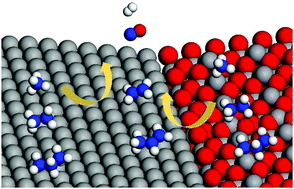
Chem. Soc. Rev., 2021,50, 4299-4358
https://doi.org/10.1039/D0CS01262A
Status and prospects of the decentralised valorisation of natural gas into energy and energy carriers
We critically review the recent advances in process, reactor, and catalyst design that enable process miniaturisation for decentralised natural gas upgrading into electricity, liquefied natural gas, fuels and chemicals.
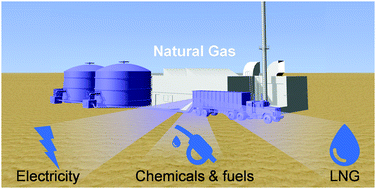
Chem. Soc. Rev., 2021,50, 2984-3012
https://doi.org/10.1039/D0CS01506G
Propane dehydrogenation: catalyst development, new chemistry, and emerging technologies
This review describes recent advances in the propane dehydrogenation process in terms of emerging technologies, catalyst development and new chemistry.
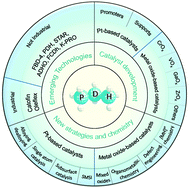
Chem. Soc. Rev., 2021,50, 3315-3354
https://doi.org/10.1039/D0CS00814A
Oxidative dehydrogenation of light alkanes to olefins on metal-free catalysts
Metal-free boron- and carbon-based catalysts for the oxidative dehydrogenation of light alkanes is reviewed from the preparation methods, characterization, catalytic performance and mechanistic issues.
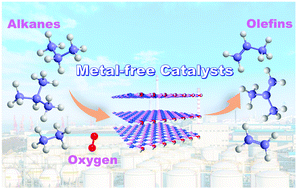
Chem. Soc. Rev., 2021,50, 1438-1468
https://doi.org/10.1039/D0CS01174F
Methane activation by ZSM-5-supported transition metal centers
The literature on methane dehydroaromatization (MDA) to benzene using ZSM-5 supported, group V–VIII transition metal-based catalysts (MOx/ZSM-5) is critically reviewed with a focus on in situ and operando molecular insights.
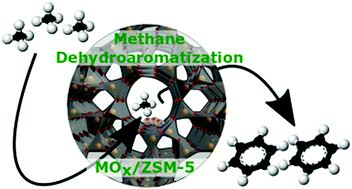
Chem. Soc. Rev., 2021,50, 1251-1268
https://doi.org/10.1039/D0CS01016B
Current status and perspectives in oxidative, non-oxidative and CO2-mediated dehydrogenation of propane and isobutane over metal oxide catalysts
Conversion of propane or isobutane from natural/shale gas into propene or isobutene, which are indispensable for the synthesis of commodity chemicals, is an important environmentally friendly alternative to oil-based cracking processes.
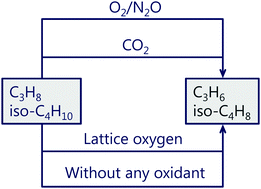
Chem. Soc. Rev., 2021,50, 473-527
https://doi.org/10.1039/D0CS01140A
About this collection
Guest Edited by Jinlong Gong (Tianjin University, China) and Bert Weckhuysen (Utrecht University, Netherlands), this collection covers all aspects of alkane conversion. Hydrocarbons, especially saturated hydrocarbons (alkanes, which includes methane, light alkanes, such as ethane, propane and butane as well as long-chain alkanes, such as hexadecane), are the main constituents of crude oil and natural gas, the current feedstocks for chemical industry. It is apparent that transformations of alkane constitute an extremely important field of contemporary chemistry. However, the inherent chemical properties of alkanes, including strong and localized C-H and C-C bonds, make it very inert. Therefore, effective activation and conversion routes of alkanes into highly valuable products remains a big challenge.